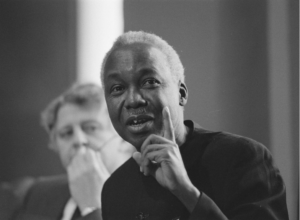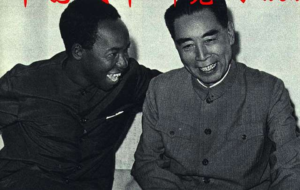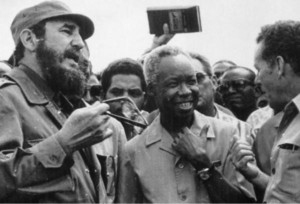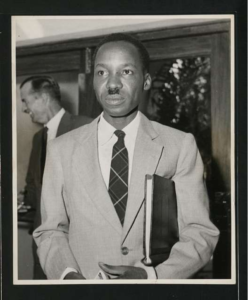Political Ideology as Told Through his Speeches
Hudson Hohman
May 4, 2022

Nyerere’s Political Ideology:
1) Supporter of Decolonization and African Nationalnist
2) Foriegn Policy: Close ties with Eastern powers especially China
3) Socialism and Ujamaa
4) Human Development / Supporter of Education
5) Ran a One-Party System Dictatorship While Simultaneously Calling for Democracy
6) African Unionist
<iframe width=”827″ height=”465″ src=”https://www.youtube.com/embed/q_gEGEJpxZg” title=”Rare Footage of Julius Nyerere at the UN General Assembly IN 1961″ frameborder=”0″ allow=”accelerometer; autoplay; clipboard-write; encrypted-media; gyroscope; picture-in-picture; web-share” allowfullscreen></iframe>
1) Supporter of Decolonization
UN Speech: December 14, 1961
Julius Nyerere spoke to the UN at the meeting discussing the admittance of Tanganyika into the assembly. Nyerere thanks both the UN and the United Kingdom for their help and support that allowed for their peaceful independence. He labels himself a nationalist and calls for the liberation of all African colonies.
“No country is completely free if it keeps other people in a state of unfreedom”

Nyerere with a Chinese official on a visit to China in 1965
2) Foreign Policy: Close ties with Eastern powers especially China
Relations With the West / East:
In his speech during the Commonwealth conference on June 23, 1965, Nyerere focused on African relations with the Western bloc and their commitment to democracy. He thanked England for their support during their independence movement. Upon being asked about his relations with the East, Nyerere admitted to accepting help from communist countries, mainly China. He also challenged England and other European countries that challenged his commitment to liberal democracy. Nyerere turned the question back on England and pointed out their continued support of Portugal in their racist colonial regime in Southern Rodesia.
“You are not being neutral if you continue to sell arms and other economic weapons to Portugal on the grounds that she is a member of NATO while Portugal is using her arms and such economic strength as she has in an effort to retain control over her colonies.”

Nyerere with Fidel Castro, the leader of Cuba
3) Socialism and Ujamaa
Arusha Declaration: April 29, 1967
One of the most significant moments in Nyerere’s presidency was the introduction of the Arusha Declaration. While this is not a speech, the conditions were deliberated by the National Executive Committee, and the Declaration outlines Nyerere’s vision for the country. Nyerere had spent most of 1962 traveling the country and developing his political ideology of “Ujamaa” which is a form of African socialism. The work is broken into five different parts; the declaration describes a clear plan for Tanganyika. Part I: The beginning establishes the one party of the state’s mission and ideology. It primarily concerns equality and building a socialist state. The next part explains their socialist policies, which place the means of production in control of the government and workers. Part three emphasizes the importance of a self-reliant state and the development of the people within to achieve that goal. It focuses primarily on educating and developing peasants: Parts four and five detail TANU membership and the organization of the government and its party.

4) Human Development / Supporter of Education
The Power of Teachers: August 27, 1966
Julius Nyerere deeply believed in the benefits of education. An important piece of the Ujamaa ideology was human development, especially through early education. Through his policy, he implemented universal primary schooling throughout his country. Tanzania also boasted one of the highest literacy rates on the African continent at the time. His speech given at the opening of the Morogoro Teachers’ College not only shows his dedication to creating the conditions for proper schooling but also his passion for teaching. His nickname “Mwalimu” means teacher. In his speech, he praises the new crop of educators and ensures they know just how important they are to the future of their country.
“The truth is that it is teachers more than any other single group of people who determine these attitudes and who shape the ideas and aspirations of the nation.”
5) Ran a One-Party System Dictatorship While Simultaneously Calling for Democracy
6) African Unionist
Interview in 1966:
Nyerere discusses his views on having a one-party democratic system. He explains that people in the West think that democracy cannot exist in a one-party system. Julius disagrees and says his people feel that they have power within their government. Nyerere actually believed that the one-party system provided a more democratic system for his people. He spoke on the union with Zanzibar. Nyerere believed the two states were equal despite their disparity in size and population. Finally, he explained his vision for a United East Africa and ultimately why the idea failed. The prospect of an African republic was made more difficult because the states were developed independently.
“In East Africa, we should have become united before we became independent before we became separate states.”
Bibliography
Bjerk, Paul. Julius Nyerere. Ohio University Press, 2017.
Nyerere, Julius K. Freedom and Socialism. Uhuru Na Ujamaa; a Selection from Writings and Speeches, 1965-1967. Oxford University Press, 1971.